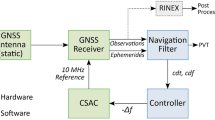Abstract
Fast unbiased finite impulse response (UFIR) filtering of polynomial signals can be provided in the discrete Fourier transform (DFT) domain employing fast Fourier transform (FFT). We show that the computation time can further be reduced by utilizing properties of UFIR filters in the DFT domain. The transforms have been found and investigated in detail for low-degree FIRs most widely used in practice. As a special result, we address an explicit unbiasedness condition uniquely featured to UFIR filters in DFT domain. The noise power gain and estimation error bound have also been discussed. An application is given for state estimation in a crystal clock employing the Global Positioning System based measurement of time errors provided each second. Based upon it, it is shown that filtering in the time domain takes about 1 second, which is unacceptable for real-time applications. The Kalman-like algorithm reduces the computation time by the factor of about 8, the FFT-based algorithm by about 18, and FFT with the UFIR filter DFT properties by about 20.



Similar content being viewed by others
Notes
Here and in the following, \(\hat{x}_{n\mid v}\) means the estimate of x n at n via measurement from the past to v.
References
H.S. Ali, M. Zasadzinski, H. Rafaralahy, M. Darouach, Robust H ∞ reduced order filtering for uncertain bilinear systems. Automatica 42(3), 405–415 (2006)
G. Aneiros-Perez, J.M. Vilar-Fernandez, Local polynomial estimation in partial linear regression models under dependence. Comput. Stat. Data Anal. 52(5), 2757–2777 (2008)
S. Bittanti, F.A. Cuzzola, An LMI approach to periodic discrete-time unbiased filtering. Syst. Control Lett. 42(1), 21–35 (2009)
M. Blum, On the mean square noise power of an optimum linear discrete filter operating on polynomial plus white noise input. IRE Trans. Inf. Theory 3(4), 225–231 (1957)
E. Brookner, Tracking and Kalman Filtering Made Easy (Wiley, New York, 1998)
T.G. Campbell, Y. Neuvo, Predictive FIR filters with low computational complexity. IEEE Trans. Circuits Syst. 38(9), 1067–1071 (1991)
P. Castro-Tinttori, O. Ibarra-Manzano, Y.S. Shmaliy, Implementation of digital unbiased FIR filters with polynomial impulse responses. Circuits Syst. Signal Process. 31(2), 611–626 (2012)
E. Dietzenbacher, Multiplier estimates: to Bias or not to Bias? J. Reg. Sci. 46(4), 773–786 (2006)
X.Z. Gao, S.J. Ovaska, X. Wang, A fuzzy filter for sinusoidal signals with time-varying frequencies. Int. J. Signal Process. 1(2), 100–104 (2004)
D. Gesbert, P. Duhamel, Unbiased blind adaptive channel identification and equalization. IEEE Trans. Signal Process. 48(1), 148–158 (2000)
P. Heinonen, Y. Neuvo, FIR-median hybrid filters with predictive FIR structures. IEEE Trans. Acoust. Speech Signal Process. 36(6), 892–899 (1988)
C.-S. Hsieh, Extension of unbiased minimum-variance input and state estimation for systems with unknown inputs. Automatica 45(9), 2149–2153 (2009)
X. Hu, Unbiasedness on rays of the tests of locations of homogeneous means in isotonic regression. Stat. Probab. Lett. 76(10), 976–980 (2006)
P.J. Huber, E.M. Ronchetti, Robust Statistics, 2nd edn. (Wiley, Hoboken, 2009)
IEEE Standard 1139, Standard definitions of physical quantities for fundamental frequency and time metrology—random instabilities (1999)
A.H. Jazwinski, Stochastic Processes and Filtering Theory (Academic Press, New York, 1970)
P.S. Kim, M.E. Lee, A new FIR filter for state estimation and its applications. J. Comput. Sci. Technol. 22(5), 779–784 (2007)
W.H. Kwon, S. Han, Receding horizon control: model predictive control for state models (Springer, London, 2005)
A. Leick, GPS Satellite Surveying, 3rd edn. (Wiley, Hoboken, 2004)
V.J. Mathews, G.L. Sicuranza, Polynomial Signal Processing (Wiley, New York, 2000)
E.B. Nicolov, S.N. Nazar, I.N. Psaromiligkos, Channel estimation for chip-level Alamouti coded multi-rate CDMA: blind subspace algorithms and performance analysis. Eur. Trans. Telecommun. 19(3), 315–328 (2008)
H.J. Nussbaumer, Fast Fourier Transform and Convolution Algorithms, 2nd edn. (Springer, New York, 1982)
S.J. Ovaska, O. Vainio, T.I. Laakso, Design of predictive IIR filters via feedback extension of FIR forward predictors. IEEE Trans. Instrum. Meas. 46(5), 1196–1201 (1997)
L.R. Rabiner, B. Gold, Theory and Applications of Digital Signal Processing (Prentice-Hall, Englewood Cliffs, 1975)
Y.S. Shmaliy, An unbiased FIR filter for TIE model of a local clock in applications to GPS-based timekeeping. IEEE Trans. Ultrason. Ferroelectr. Freq. Control 53(5), 862–870 (2006)
Y.S. Shmaliy, Linear optimal FIR estimation of discrete time-invariant state-space models. IEEE Trans. Signal Process. 58(6), 3086–3096 (2010)
Y.S. Shmaliy, An iterative Kalman-like algorithm ignoring noise and initial conditions. IEEE Trans. Signal Process. 59(6), 2465–2473 (2011)
Y.S. Shmaliy, O. Ibarra-Manzano, Noise power gain for discrete-time FIR estimators. IEEE Signal Process. Lett. 15(4), 207–210 (2011)
Y.S. Shmaliy, J. Muñoz-Diaz, L. Arceo-Miquel, Optimal horizons for a one-parameter family of unbiased FIR filters. Digit. Signal Process. 18(5), 739–750 (2008)
M. Sugiyama, H. Ogawa, A unified method for optimizing linear image restoration filters. Signal Process. 82(11), 1773–1787 (2002)
G.A. Williamson, P.M. Clarkson, On signal recovery with adaptive order statistic filters. IEEE Trans. Signal Process. 40(10), 2622–2626 (1992)
Author information
Authors and Affiliations
Corresponding author
Appendix: Low-degree unbiased FIR filter impulse responses
Appendix: Low-degree unbiased FIR filter impulse responses
The following impulse responses [25] are unique for unbiased FIR filtering of linear, quadratic, and cubic signals, respectively, on an interval of N past-points from n−N+1 to n:



Rights and permissions
About this article
Cite this article
Castro-Tinttori, P., Ibarra-Manzano, O. & Shmaliy, Y.S. Computationally Efficient FIR Filtering of Polynomial Signals in DFT Domain. Circuits Syst Signal Process 31, 2153–2166 (2012). https://doi.org/10.1007/s00034-012-9433-y
Received:
Revised:
Published:
Issue Date:
DOI: https://doi.org/10.1007/s00034-012-9433-y




